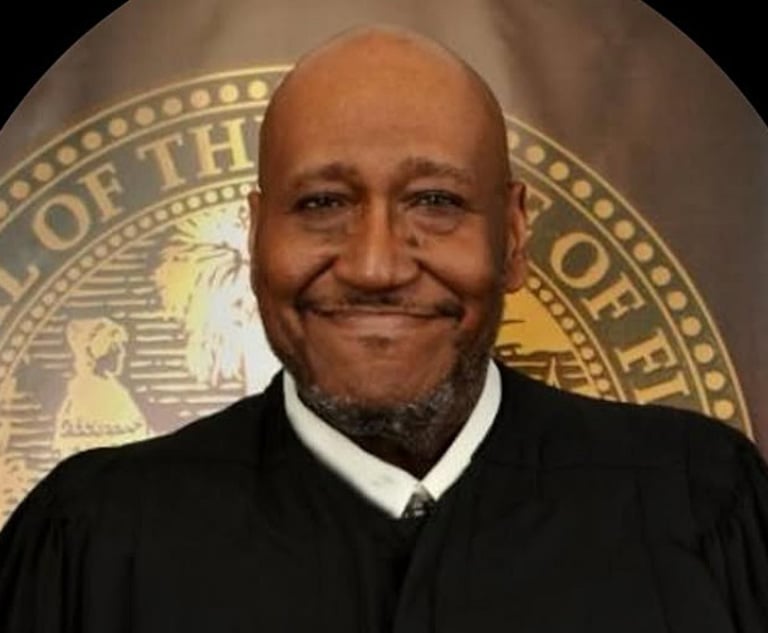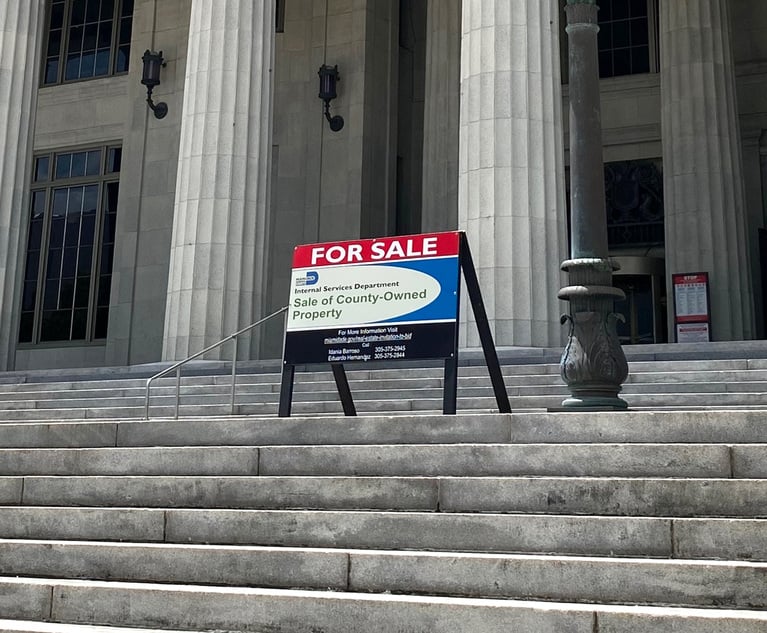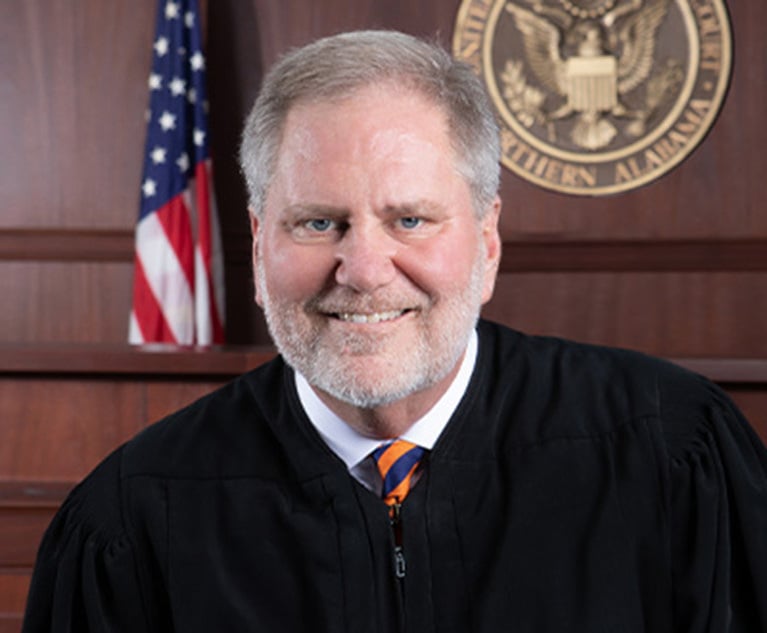 U.S. District Judge Aileen M. Cannon of the U.S. District Court for the Southern District of Florida. Courtesy photo
U.S. District Judge Aileen M. Cannon of the U.S. District Court for the Southern District of Florida. Courtesy photo Trump-Appointed Judge Courts Controversy With Mar-a-Lago Order
Many critics of the judge have highlighted her conservative credentials, especially her longtime membership in the Federalist Society, in trying to explain her ruling.
September 06, 2022 at 08:53 AM
5 minute read
When US District Judge Aileen Cannon was up for Senate confirmation in 2020, she was pointedly asked whether she'd had discussions about loyalty to then-President Donald Trump before he nominated her to Florida's federal bench.
"No," Cannon responded to US Senator Dianne Feinstein.
Suspicions of Trump loyalty again circled Cannon on Monday after she issued a sweeping decision granting the former president's request to appoint an outside special master to review documents seized by the FBI in its Aug. 8 search of his Mar-a-Lago home. She also ordered the Justice Department to temporarily stop using the documents in its criminal investigation of Trump's retention of them after leaving office.
Cannon, 41, agreed with Trump's lawyers that investigation of the former president needed additional "safeguards" because he faced greater risks than ordinary citizens.
"As a function of plaintiff's former position as President of the United States, the stigma associated with the subject seizure is in a league of its own," the judge wrote. "A future indictment, based to any degree on property that ought to be returned, would result in reputational harm of a decidedly different order of magnitude.
'Courage and Guts'
Cannon held that a special master could determine whether Trump had valid claims of executive privilege over some of the documents. The Justice Department had argued that a former president couldn't assert executive privilege against the sitting president, but Cannon found that wasn't settled law.
Trump appeared to praise the judge in a statement Monday in which he said "it takes courage and 'guts' to fight a totally corrupt Department of 'Justice' and the FBI."
The Justice Department said it was examining the opinion and considering "appropriate next steps."
Several legal commentators swiftly condemned the decision on Twitter. Former federal prosecutor Andrew Weissmann, who was a senior member of Special Counsel Robert Mueller's team during the Russia investigation, called it "nutty" and "lawless." New York University law professor Chris Sprigman said it was "partisan hack judging," while prominent lawyer Ted Boutrous derided Cannon's order as "the opposite of judicial restraint."
Speaking before Monday's ruling, Michael Sherwin, a friend of Cannon and former acting US attorney in Washington, dismissed the idea that she would grant Trump's request out of political loyalty.
"Unfortunately people see that and think, 'Oh, she's a Trump appointee, she's going to tip the scales on his behalf,'" he said. "She's not. She's going to make sure when the bureau executed that search warrant, she's going to make sure the former president's rights were protected just as all citizens' rights should be protected."
Federalist Society
Many critics of the judge on Monday highlighted her conservative credentials, especially her longtime membership in the Federalist Society, in trying to explain her ruling. Cannon joined the nation's leading group for conservative lawyers, which served as a pipeline for judgeships under Trump, while she was a law student at the University of Michigan.
Cannon, a former federal prosecutor, only just cleared the American Bar Association's recommendation that judicial nominees have at least 12 years of experience; she was 39 when Trump nominated her for a lifetime appointment. Asked about her ties to the Federalist Society during her confirmation, she denied that she'd joined the organization in the hopes of getting a boost to the bench someday. She said she "enjoyed the diversity of legal viewpoints discussed" at events and found the discussion of certain legal principles "interesting."
The fact that a judge is nominated by a particular president doesn't automatically disqualify them from hearing cases that involve that president. Many of Trump's nominees have ruled in ways that Republicans hoped for and Democrats feared on issues like abortion, religious liberty, gun rights, immigration, and voting rights. But Trump at times has been handed losses in court by his own appointees, some with similar conservative backgrounds to Cannon.
Trump has frequently suggested that judges are politically biased towards him though. In a pending racketeering lawsuit alleging a vast conspiracy to harm his reputation by Hillary Clinton and many other people, Trump sought US District Judge Donald Middlebrooks's recusal from the case because he was appointed by Bill Clinton. Middlebrooks refused, while noting that Trump originally filed the case in the courthouse where Cannon is the only judge regularly serving.
Trump's lawyers filed his request for a special master to review the Mar-a-Lago documents in the court's Palm Beach County division, but it ended up with Cannon, which can happen when courts randomly assign new cases across different locations within a district.
After graduating law school in 2007, Cannon clerked for a Republican-appointed federal appeals court judge and then spent three years as an associate with Gibson, Dunn & Crutcher in Washington. In 2013, she joined the US attorney's office for the Southern District of Florida.
Cannon shared in her Senate questionnaire that Florida Senator Marco Rubio's office reached out to her about applying for a district court seat in 2019. The vetting process included meetings with the White House counsel's office but not Trump himself, she said.
She was confirmed by a 56-21 vote on Nov. 12, 2020 — just five days after major media called the election for Joe Biden — as part of a post-election push by then-Majority Leader Mitch McConnell to move through Trump's remaining nominees while Republicans still held the Senate.
Until now, her most politically charged case involved a man who made violent threats against two prominent Democrats — House Speaker Nancy Pelosi and Representative Alexandria Ocasio-Cortez. Prosecutors asked for a 3 1/2 years sentence; Cannon gave him 18 months.
NOT FOR REPRINT
© 2025 ALM Global, LLC, All Rights Reserved. Request academic re-use from www.copyright.com. All other uses, submit a request to [email protected]. For more information visit Asset & Logo Licensing.
You Might Like
View All
Tributes Pour in for Pioneering Miami Judge, UM Adviser

Attorney Emerges as Possible Owner of Historic Miami Courthouse Amid Delays of New Building

A Judge Ordered Squabbling Lawyers to Have Lunch: Here's What Happened

Sorry. We Can't Get to Your Case: Judge Speaks Out on Judicial Shortages
Law Firms Mentioned
Trending Stories
Who Got The Work
J. Brugh Lower of Gibbons has entered an appearance for industrial equipment supplier Devco Corporation in a pending trademark infringement lawsuit. The suit, accusing the defendant of selling knock-off Graco products, was filed Dec. 18 in New Jersey District Court by Rivkin Radler on behalf of Graco Inc. and Graco Minnesota. The case, assigned to U.S. District Judge Zahid N. Quraishi, is 3:24-cv-11294, Graco Inc. et al v. Devco Corporation.
Who Got The Work
Rebecca Maller-Stein and Kent A. Yalowitz of Arnold & Porter Kaye Scholer have entered their appearances for Hanaco Venture Capital and its executives, Lior Prosor and David Frankel, in a pending securities lawsuit. The action, filed on Dec. 24 in New York Southern District Court by Zell, Aron & Co. on behalf of Goldeneye Advisors, accuses the defendants of negligently and fraudulently managing the plaintiff's $1 million investment. The case, assigned to U.S. District Judge Vernon S. Broderick, is 1:24-cv-09918, Goldeneye Advisors, LLC v. Hanaco Venture Capital, Ltd. et al.
Who Got The Work
Attorneys from A&O Shearman has stepped in as defense counsel for Toronto-Dominion Bank and other defendants in a pending securities class action. The suit, filed Dec. 11 in New York Southern District Court by Bleichmar Fonti & Auld, accuses the defendants of concealing the bank's 'pervasive' deficiencies in regards to its compliance with the Bank Secrecy Act and the quality of its anti-money laundering controls. The case, assigned to U.S. District Judge Arun Subramanian, is 1:24-cv-09445, Gonzalez v. The Toronto-Dominion Bank et al.
Who Got The Work
Crown Castle International, a Pennsylvania company providing shared communications infrastructure, has turned to Luke D. Wolf of Gordon Rees Scully Mansukhani to fend off a pending breach-of-contract lawsuit. The court action, filed Nov. 25 in Michigan Eastern District Court by Hooper Hathaway PC on behalf of The Town Residences LLC, accuses Crown Castle of failing to transfer approximately $30,000 in utility payments from T-Mobile in breach of a roof-top lease and assignment agreement. The case, assigned to U.S. District Judge Susan K. Declercq, is 2:24-cv-13131, The Town Residences LLC v. T-Mobile US, Inc. et al.
Who Got The Work
Wilfred P. Coronato and Daniel M. Schwartz of McCarter & English have stepped in as defense counsel to Electrolux Home Products Inc. in a pending product liability lawsuit. The court action, filed Nov. 26 in New York Eastern District Court by Poulos Lopiccolo PC and Nagel Rice LLP on behalf of David Stern, alleges that the defendant's refrigerators’ drawers and shelving repeatedly break and fall apart within months after purchase. The case, assigned to U.S. District Judge Joan M. Azrack, is 2:24-cv-08204, Stern v. Electrolux Home Products, Inc.
Featured Firms
Law Offices of Gary Martin Hays & Associates, P.C.
(470) 294-1674
Law Offices of Mark E. Salomone
(857) 444-6468
Smith & Hassler
(713) 739-1250






